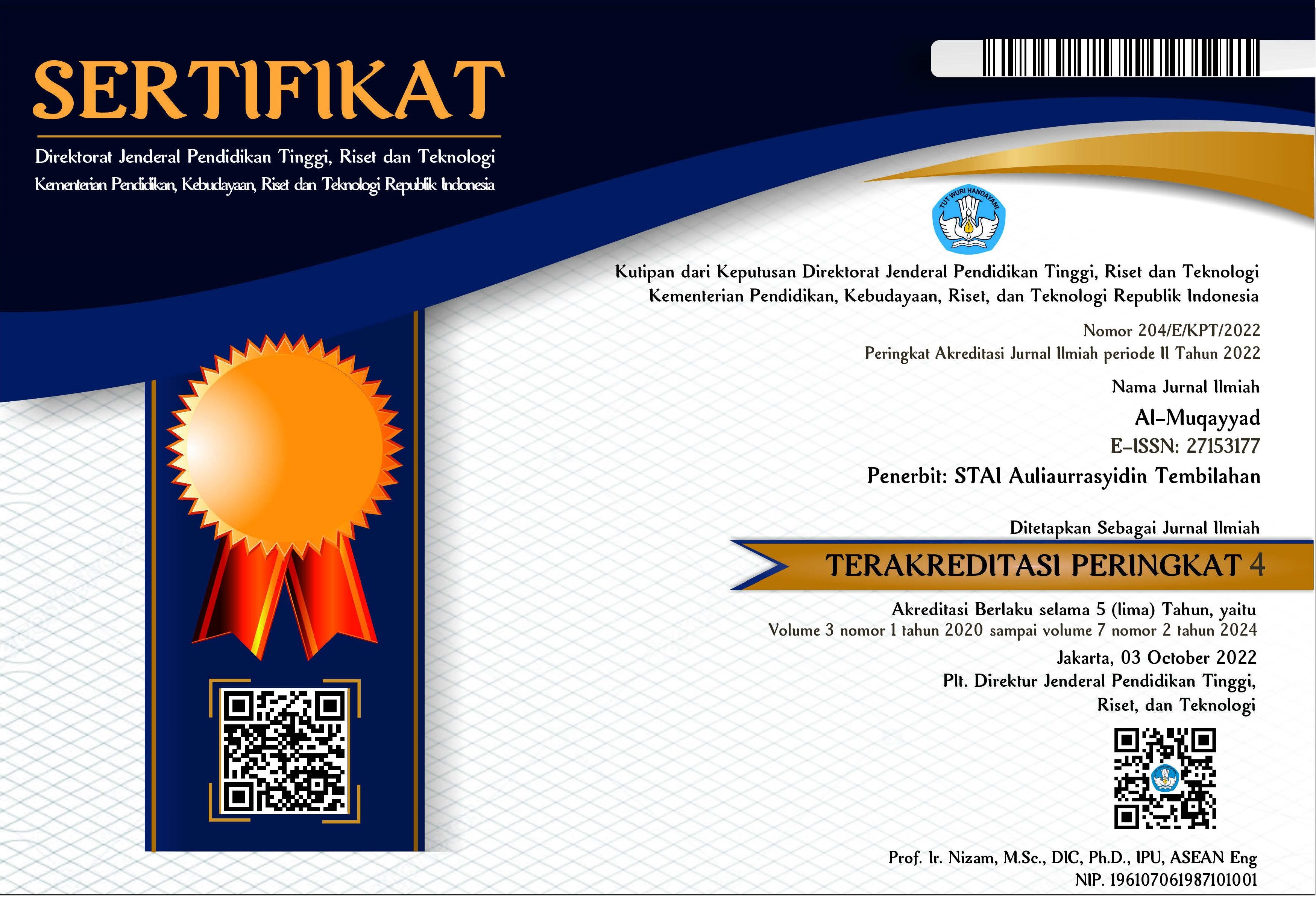Pemahaman Pelaku Usaha dalam Mengurus Sertifikasi Halal Usaha Mikro Kecil dan Menengah (UMKM)
DOI:
https://doi.org/10.46963/jam.v6i2.1143Keywords:
Business Actors, Halal certification, UMKMAbstract
Human need nutrition. The need for nutritien as food is fundamental. Food includes all the basic needs that the body absorbs, such as water, medicines and other substances for body health. On he health side, food not only functions as a source of energy in the body, but can also spread disease. So it is necessery to do food sanitation to avoid disease. On this basis, an understanding of food health as well as halal and good food needs to be dissimenated by government agencies throuth the ministry of relegion, particularly regarding halal certification. This is the basis of the researc carried out, how is the understanding of bussines actors in managing the steps for halal certification for UMKM. This reseach methode is descriptive qualitative with the type of field research. The research was conducted in Indragiri Hilir Regency, Riau. The result of this study show that the understanding the halal certification is quite good, but the socializatin needs to be improved so that knowledge about halal product is even better. One of the organization that can carry out this sosialization is Non-PNS Islamic Religious Extension.
Downloads
References
Abdullah, I. (2017) Mandatory Sertifikasi Halal dan Keberlansungan Dunia Usaha. Tersedia online pada https://republika.co.id/berita/jurnalisme-warga/wacana/17/12/28/p1npq4396-mandatory-sertifikasi-halal-dan keberlansungan-dunia-usaha
Afroniyati, Lies. (2014) “Analisis Ekonomi Politik Sertifikasi Halal Oleh Majelis Ulama Indonesia.” JKAP (Jurnal Kebijakan dan Administrasi Publik) 18, (1): 37-54.
Agustina, Yuli dkk. (2019). Pentingnya Penyuluhan Sertifikasi Jaminan Produk Halal Untuk Usaha Kecil Menengaha (UKM). Jurnal Graha Pengabdian, 1(2).
Al-Fatih, S. (2022). Urgensi Serifikat Halal MUI Bagi Pengusaha Makanan dan Minumana di Kota Malang. Jurnal Dedikasi Hukum, 2(1), 64-74.
Anandita, S dkk. (2022). Peningkatan Daya Saing Produk Industri Makanan Olahan UMKM Melalui Pelatihan Sertifikasi Halal dan BPOM. Jumat Ekonomi: Jurnal Pengabdian Masyarakat, 3(3): 183-187
Aslikhah dan Moh. Mukhsinin Syu’aibi (2023). Fenomenologi Self Declare Sertifikasi Halal Bagi Pelaku UMKM Produk Makanan dan Minuman Untuk Peningkatan Awareness Sertifikasi Halal Di Kabupaten Pasuruan. Jurnal Mu’allim, 5(1).
Azhar Mushafa dkk (2023). Pemberdayaan UMKM Desa Pasuruhan Melalui sertifikasi Halal dan P-IRT. BEMAS: Jurnal Bermasyarakat, 4(2)
Aziz M. (2017), “Perspektif Maqashid Al-Syariah Dalam Penyelenggaraan Jaminan Produk Halal di Indonesia Pasca Berlakunya Undang-Undang Nomor 33 Tahun 2014 Tentang Jaminan Produk Halal, AL-HIKMAH Jurnal Studi Keislaman,;7 (2):78–84
Chairunnisyah, Sheilla. (2017) “Peran Majelis Ulama Indonesia Dalam Menerbitkan Sertifikat Halal Pada Produk Makanan Dan Kosmetika.” EduTech: Jurnal Ilmu Pendidikan Dan Ilmu Sosial 3, (2): 64-75
Faidah, Mutimmatul. (2017), “Sertifikasi Halal Di Indonesia Dari Civil Society Menuju Relasi Kuasa Antara Negara dan Agama.” ISLAMICA: Jurnal Studi KeIslaman 11, (2): 449-476
Fuadi, Soemitra dkk. (2022). Studi Literatur Implementasi Sertifikasi Halal Produk UMKM. Jurnal EMT KITA, 6(1):118-125.
Hasan, KN. Sofyan N. (2014), “Kepastian Hukum Sertifikasi Dan Labelisasi Halal Produk Pangan.” Jurnal Dinamika Hukum 14, (2): 227-238
Huda, N. (2012) Pemahaman Produsen Makanan tentang Sertifikasi Halal (Studi Kasus diSurakarta). Ishraqi, 10 (1):1–13.
LPPOM MUI, (2008). Panduan Umum Sistem Jaminan Halal LPPOM–MUI. Jakarta. Tersediaonline pada http://www.halalmui.org/images/stories/pdf/sjh-indonesia.pdf
Luthfiyah, Muh Fitrah &. Metodologi penelitian: penelitian kualitatif, tindakan kelas & studi kasus. CV Jejak (Jejak Publisher), 2018
Maulidia, Rahmah. (2013), “Urgensi Regulasi Dan Edukasi Produk Halal Bagi Konsumen.” Justitia Islamica 10, (2)
Muhamad, M. (2020). Tantangan dan Peluang Penerapan Kebijakan Mandatory Sertifikasi Halal (Studi Implementasi UU No. 33 Tahun 2014 dan PP No.31 Tahun 2019). Jurnal Ilmu Ekonomi dan Bisnis Islam, 2(2): 1-26
Purnama, C. (2015). Sertifikasi Halal dalam Produk UMKM. Tersedia online padahttp://radarsemarang.com/2015/12/15/sertifikasi-halal-dalam-produk-umkm
Rifa’i, Mochamad Novi. (2018), “Promosi Makanan Halal di Kota Taipei, Taiwan.” FALAH: Jurnal Ekonomi Syariah 3, (1): 112-121
Salehudin, I. (2010). Halal Literacy: A Concept Exploration and Measurement Validation. Asean Marketing Journal, 2(1):1–12.
Sholihah, Amaliatus dkk. (2022). Pendekatan Theory Of Planned Bahavior dalam Melakukan Sertifikasi Halal Bagi Pelaku UMKmM Sektor Halal Food di Kabupaten Bangkalan. Jurnal Manejki. 11(2):427-439.
Syarifuddin Hidayat, Asep, dan Mustolih Siradj. (2015), “Sertifikasi Halal Dan Sertifikasi Non Halal Pada Produk Pangan Industri.” AHKAM 15, (2): 199-210
Tahliani, Hani.(2023). Sertifikasi Halal dan Implikasinya Untuk Meningkatkan Daya Saing Perusahaan. Syarie: Jurnal Pemikiran Ekonomi Islam, 6(1),1-12.
Ulfin, dkk. (2022). Sosialisasi Halal dan Pendampingan Sertifikasi Halal untuk UMKM Kelurahan Simokerto. Sewagati, 6(1): 10-17.
Uswatun Hasanah dkk (2023). Pendampingan Sertifikasi Halal Sebagai Strategi Peningkatan Daya Saing Produk Pangan Umkm Desa Wisata Melung. JMM: Jurnal Masyarakat Mandiri, 7(5).
Wahyuni, Ika dan Sarkawi. (2023). Persepsi UMKM Tentang Regulasi Sertifikasi Halal Jalur Self Declare di Kecamatan Kamal Kabupaten Bangkalan. Moro; Jurnal Ekonomi Syariah dan Bisnis, 6(1): 147-158.
W.Widayat, S.Sulardjaka, A.Al-Baarri, dan R.Nurjannah. Pendampingan Sertifikasi Haal Pada UMKM Hanum Food (Halal Certification Support In UMKM Hanum Food). Indonesia journal of Halal, 3(1):83-87.
Undang-Undang No. 33 Tahun 2014tentang Jaminan Produk Halal
“Undang-Undang Republik Indonesia Nomor 33 Tahun 2014 Tentang Jaminan Produk Halal.” Diakses 24 Januari 2019. http://www.dpr.go.id.
“Undang-UndangNomor 20 Tahun 2008 Tentang Usaha Mikro, Kecil dan Menengah.” http://www.dpr.go.id.
Downloads
Published
Issue
Section
License
Copyright (c) 2023 Junaidi Junaidi, Jhon Afrizal, Nadia Deby Sukanti

This work is licensed under a Creative Commons Attribution-ShareAlike 4.0 International License.
Authors who publish with this journal agree to the following terms:
1. Copyright on any article is retained by the author(s).
2. The author grants the journal, right of first publication with the work simultaneously licensed under a Creative Commons Attribution shareAlike 4.0 International License that allows others to share the work with an acknowledgment of the work’s authorship and initial publication in this journal.
3. Authors are able to enter into separate, additional contractual arrangements for the non-exclusive distribution of the journal’s published version of the work (e.g., post it to an institutional repository or publish it in a book), with an acknowledgment of its initial publication in this journal.
4. Authors are permitted and encouraged to post their work online (e.g., in institutional repositories or on their website) prior to and during the submission process, as it can lead to productive exchanges, as well as earlier and greater citation of published work.
5. The article and any associated published material is distributed under the Creative Commons Attribution-ShareAlike 4.0 International License





2.png)



